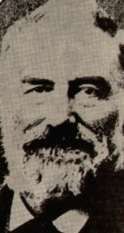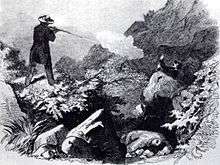Stephen Venard
Steve Venard (c. 1823 in Lebanon, Ohio – May 20, 1891 in Nevada City, California) was a Northern California lawman,[1] and renowned road agent killer.[2] In the course of his career, he killed six highwaymen and made several important captures.[3] He is known for participating in one of the classic gun duels of the Old West,[4] and for being one of the most fearless lawmen of the California Gold Rush era.[5]

Early years
Venard was born on a farm in Lebanon, Ohio, USA. He received his education at Waynesville Academy in Waynesville, Ohio. After moving to Newport (now Fountain City), Indiana, Venard became the first teacher of the joint town and township school.[6] Because of his participation with the Underground Railroad, a bounty was put on him, so he headed to California in March 1850 with a group of 24 others in covered wagons, arriving in September 1850.[4]
Career
Early on upon reaching California's Gold country, Venard tried his hand at gold mining, settling first in Colfax, but by December 1850, he had moved to the North Fork of the American River. In 1851, he moved again, through Downieville, and then to Nevada City. He decided to make Nevada City his home, and by 1853, had opened a grocery store on Broad Street. By 1854, he became a partner in operating the Empire Mining Company.[4] In 1855, he became a Nevada County deputy but resigned the following year. He ran for the office of Sheriff against Henry Plummer in 1857 but lost.[4]
In 1864, Venard was elected a part-time City Marshal in Nevada City.[7] He also worked as a detective, Wells Fargo guard and special officer.[3]

Considered at the time as the "most remarkable cleanup of road agents on record",[8] Venard tracked and killed three Wells Fargo stagecoach robbers on May 15, 1866 in the Yuba River's Myers' Ravine[9] with four shots from his Henry rifle,[1] returned the stolen $8,000 of gold dust, and then apologized for the excess shot.[10] When offered a reward by Wells Fargo, Venard accepted only half, and split the rest with his posse.[4] He received an inscribed, gold-mounted Henry rifle from Wells Fargo, and Governor Frederick Low appointed Venard to his personal staff with the rank of Lieutenant Colonel for "meritorious services in the field".[8][11] According to Harper's Weekly, "No romance could depict greater bravery".[4]
The Henry Rifle hangs in the Wells Fargo Museum in San Francisco, CA
In June 1866, Venard was appointed resident deputy sheriff at Meadow Lake City; here, he was appointed City Marshall and became a member of the Meadow Lake Yachting Club.[4] By 1869, he was commissioned as a Deputy Sheriff.[7] After being sent to Sonoma County in 1871 to investigate the Houx Gang, a group of Wells Fargo stage robbers, Venard played an important role in the capture of John Houx.[2]
After retiring from his career as a lawman due to advancing age and chronic rheumatism, Venard became a partner in the Detective Mine on Cement Hill in 1888.[4]
Personal life
Venard was almost six feet tall. He had wavy black hair, and a full beard. Never married, he spent his leisure time reading books at the Library Association. Venard died of kidney failure in 1891 in Nevada City. Having died penniless, his friends paid for his burial at Nevada City's Pioneer Cemetery.[4][7]
References
- Thrapp, Dan L. (1991). "Venard, Stephen". Encyclopedia of Frontier Biography. P–Z. U of Nebraska Press. ISBN 0-8032-9420-4.
- Hume, James B.; Thacker, John N. Thacker; Wilson, R. Michael (2010). Wells, Fargo & Co. stagecoach and train robberies, 1870-1884: the corporate report of 1885 with additional facts about the crimes and their perpetrators. McFarland. p. 23. ISBN 0-7864-4855-5.
- Bancroft, Hubert Howe (1890). History of the Pacific States of North America: California (Google eBook ed.). A.L. Bancroft & Co. p. 205.
- Boessenecker, John (1993). Badge and Buckshot: Lawlessness in Old California. University of Oklahoma Press. pp. 37–58. ISBN 0-8061-2510-1.
- Weiser, Kathy (October 2010). "Stephen Venard - Goldrush Lawman". legendsofamerica.com. Retrieved 18 December 2010.
- Fox, Henry Clay (1912). Memoirs of Wayne County and the city of Richmond, Indiana: from the earliest historical times down to the present, including a genealogical and biographical record of representative families in Wayne County. 1 (Google eBook ed.). Western Historical Association. p. 152.
- Metz, Leon Claire Metz (2003). "Venard, Stephen". The encyclopedia of lawmen, outlaws, and gunfighters. Infobase Publishing. pp. 255–256. ISBN 0-8160-4543-7.
- Wells, William Bittle; Pease, Lute (1900). "Pacific Monthly, Volumes 4-6 edited by". Pacific Monthly. Pacific Monthly Pub. Co. 4-6 (Google eBook): 24.
- Bean, Edwin F. (1867). Bean's history and directory of Nevada County, California: Containing a complete history of the county, with sketches of the various towns and mining camps ... also, full statistics of mining and all other industrial resources. Daily Gazette Book and Job Office. p. 16.
- Wilson, R. Michael (2006). Great Stagecoach Robberies of the Old West. Globe Pequot. p. 43. ISBN 0-7627-4127-9.
- Bean, p. 18